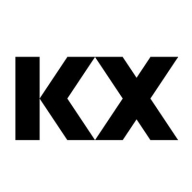

Find out what your peers are saying about Microsoft, Oracle, SAP and others in Relational Databases Tools.
| Product | Market Share (%) |
|---|---|
| SQL Server | 15.5% |
| kdb+ | 0.5% |
| Other | 84.0% |


| Company Size | Count |
|---|---|
| Small Business | 121 |
| Midsize Enterprise | 58 |
| Large Enterprise | 112 |
Kx is the world leader in high-performance, in-memory computing, streaming analytics and operational intelligence. The company’s focus is on delivering the best possible performance and flexibility for high-volume, data-intensive analytics and applications. Kx software includes the time-series database kdb+ with a built-in programming language called q, and a robust suite of visualization tools built on top of the database platform providing business intelligence for all users.
SQL Server is a relational database management system (RDBMS) by Microsoft. The product's main purposes are to store data and retrieve it as requested by other software applications - on the same computer or on another computer across a shared network. The solution is built on top of Structured Query Language (SQL), which is a standardized programming language used for relational database management.
The product is tied to Transact-SQL (T-SQL), which is an implementation of SQL from Microsoft that adds several proprietary programming extensions to the standard language. SQL Server is built similarly to other RDBMS products, as its structure is a row-based table that connects related data elements in different tables to one another. One of its most important components is the SQL Server Database Engine, as it controls data processing, storage, and security. Beneath the Database Engine is the SQL Server Operating System, which is used for memory and I/O management, locking data to avoid unneeded upgrades, and job scheduling.
The solution has four editions with different sets of services and tools. They include:
The first two are available for free and are typically utilized by smaller companies, as they work with fewer functions and storage. The second two editions are generally used by bigger organizations and enterprises and offer more features.
The solution has several functions through which users can facilitate different data-related processes. These include:
SQL Server Services
SQL Server has a wide range of add-on services that provide additional benefits beyond database management. These services include:
SQL Server Benefits
The solution has many benefits for users. These include the following:
Reviews from Real Users
A president at a consultancy evaluates SQL Server as a veteran solution with critical log shipping feature.
Harkamal S., a user at a manufacturing company, rates SQL Server with a high mark because it is a stable, scalable, and easy-to-deploy solution that pretty much covers everything.
We monitor all Relational Databases Tools reviews to prevent fraudulent reviews and keep review quality high. We do not post reviews by company employees or direct competitors. We validate each review for authenticity via cross-reference with LinkedIn, and personal follow-up with the reviewer when necessary.